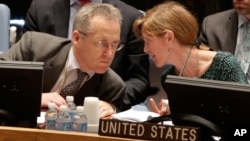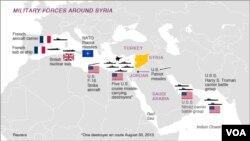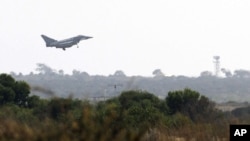The drive for a quick military response to reports of a chemical weapons attack in Syria appears to be slowing, as legislators in the United States and Britain make clear they are in no hurry to become involved in another Middle East conflict.
At the same time, United Nations Secretary-General Ban Ki-moon is urging world powers to hold off on possible military action until a U.N. chemical weapons inspection team completes its work in the country.
U.N. spokesman Farhan Haq on Thursday said the team investigating the August 21 attack near Damascus would leave the country by Saturday morning. While some will remain in Europe to analyze their samples, Haq said U.N. disarmament chief Angela Kane and other inspectors will be in New York in the coming days to brief Ban.
“They will have a large number of facts at their disposal, they’ve collected considerable amount of evidence - evidence through samples, evidence through witness interviews -- they can construct from that a fact-based narrative that can get at the key facts of what happened,” he said.
Once laboratory results are in, the team will issue a final report. Haq said, “It is imperative that the work that the investigation team does be seen by all as fair, impartial and accurate.”
Also Thursday, Russia called a meeting of the other permanent members of the Security Council. Talks with Britain, China, France and the United States lasted about 45 minutes, but diplomats did not brief reporters on what transpired. On Wednesday, the group met to discuss a resolution proposed by Britain that would authorize “all necessary measures” to protect Syrian civilians.
Washington and its European allies have made clear they think the government of Syrian President Bashar al-Assad is responsible for the suspected chemical attack, which killed hundreds of civilians, and have said a military response is needed.
The United States on Thursday sent a fifth navy destroyer to the Mediterranean; Britain is reinforcing its military on Cyprus, and Israel is bolstering its forces along the Syrian border.
Opposition grows
Even as military assets take position, the U.S. and its allies face growing opposition, both at home and abroad, to a strike against Syria.
In the U.S., more than 100 members of Congress, including several from Obama’s Democratic Party, signed a letter demanding that the administration consult with Congress before any military action.
Congressman Scott Rigell, a Republican who wrote the letter, told VOA correspondent Cindy Saine that Obama should adhere to U.S. law.
To follow the U.S. Constitution, he said, if Obama wants to use force, “he does need to call us into a joint session, make the case before the American people, allow us a reasonable amount of time to deliberate the matter and then to issue specific statutory authority prior to the use of force.”
British Prime Minister David Cameron lost a vital parliamentary vote on Thursday night meant to pave the way for Britain to join a military strike on Syria, in a move that appeared to all but rule out British involvement in such action.
On Thursday, some lawmakers questioned if British military action would draw the country further into Syria's civil war. Cameron argued that failing to respond would send Syrian President Bashar al-Assad a message that he could use chemical weapons with no fear of reprisal.
The British Defense Ministry said it has sent additional fighter jets to Cyprus as a precaution because of Middle East tensions. The Defense Ministry said the jets are not intended to be used in any operation against Syria.
Security Council members China and Russia have blocked previous attempts to impose sanctions on Assad’s regime. That has led to frustration for the U.S. and its European allies.
On Wednesday, Deputy State Department spokeswoman Marie Harf said that despite Russian opposition to a U.N. authorization of force in Syria, Washington will take its own “appropriate actions to respond in the days ahead.”
The Syrian government denies having any role in the alleged gas attacks. State media quoted Assad Thursday as saying his country will defend itself against any aggression.
Iranian President Hassan Rouhani has said his government and Russia will work to prevent an attack on Syria, and warned any assault could “bring great costs” to the region.
Iran also has warned that any Western action against Syria would result in the “imminent destruction of Israel,” a U.S. ally in the region.
Also Thursday, Canadian Prime Minister Stephen Harper said his government supports Washington and its other allies contemplating a military response to Syria. He said, however, the Canadian military would not take a role in any attack.
Later on Thursday, Obama's top national security advisers planned to brief members of Congress about intelligence on the gas attacks.
Obama says he has not decided on any action, but vowed that those who break international norms need to be held accountable.
As diplomats debate, more Syrians are expected to flee their country, which has been embroiled in a two-year civil war.
The United Nations and aid groups report new refugee flows to neighboring countries: already more than two million Syrians have fled, half of them children.
Timeline of events in Syria:
At the same time, United Nations Secretary-General Ban Ki-moon is urging world powers to hold off on possible military action until a U.N. chemical weapons inspection team completes its work in the country.
U.N. spokesman Farhan Haq on Thursday said the team investigating the August 21 attack near Damascus would leave the country by Saturday morning. While some will remain in Europe to analyze their samples, Haq said U.N. disarmament chief Angela Kane and other inspectors will be in New York in the coming days to brief Ban.
“They will have a large number of facts at their disposal, they’ve collected considerable amount of evidence - evidence through samples, evidence through witness interviews -- they can construct from that a fact-based narrative that can get at the key facts of what happened,” he said.
Once laboratory results are in, the team will issue a final report. Haq said, “It is imperative that the work that the investigation team does be seen by all as fair, impartial and accurate.”
Also Thursday, Russia called a meeting of the other permanent members of the Security Council. Talks with Britain, China, France and the United States lasted about 45 minutes, but diplomats did not brief reporters on what transpired. On Wednesday, the group met to discuss a resolution proposed by Britain that would authorize “all necessary measures” to protect Syrian civilians.
Washington and its European allies have made clear they think the government of Syrian President Bashar al-Assad is responsible for the suspected chemical attack, which killed hundreds of civilians, and have said a military response is needed.
The United States on Thursday sent a fifth navy destroyer to the Mediterranean; Britain is reinforcing its military on Cyprus, and Israel is bolstering its forces along the Syrian border.
Opposition grows
Even as military assets take position, the U.S. and its allies face growing opposition, both at home and abroad, to a strike against Syria.
In the U.S., more than 100 members of Congress, including several from Obama’s Democratic Party, signed a letter demanding that the administration consult with Congress before any military action.
Congressman Scott Rigell, a Republican who wrote the letter, told VOA correspondent Cindy Saine that Obama should adhere to U.S. law.
To follow the U.S. Constitution, he said, if Obama wants to use force, “he does need to call us into a joint session, make the case before the American people, allow us a reasonable amount of time to deliberate the matter and then to issue specific statutory authority prior to the use of force.”
British Prime Minister David Cameron lost a vital parliamentary vote on Thursday night meant to pave the way for Britain to join a military strike on Syria, in a move that appeared to all but rule out British involvement in such action.
On Thursday, some lawmakers questioned if British military action would draw the country further into Syria's civil war. Cameron argued that failing to respond would send Syrian President Bashar al-Assad a message that he could use chemical weapons with no fear of reprisal.
The British Defense Ministry said it has sent additional fighter jets to Cyprus as a precaution because of Middle East tensions. The Defense Ministry said the jets are not intended to be used in any operation against Syria.
Security Council members China and Russia have blocked previous attempts to impose sanctions on Assad’s regime. That has led to frustration for the U.S. and its European allies.
On Wednesday, Deputy State Department spokeswoman Marie Harf said that despite Russian opposition to a U.N. authorization of force in Syria, Washington will take its own “appropriate actions to respond in the days ahead.”
The Syrian government denies having any role in the alleged gas attacks. State media quoted Assad Thursday as saying his country will defend itself against any aggression.
Iranian President Hassan Rouhani has said his government and Russia will work to prevent an attack on Syria, and warned any assault could “bring great costs” to the region.
Iran also has warned that any Western action against Syria would result in the “imminent destruction of Israel,” a U.S. ally in the region.
Also Thursday, Canadian Prime Minister Stephen Harper said his government supports Washington and its other allies contemplating a military response to Syria. He said, however, the Canadian military would not take a role in any attack.
Later on Thursday, Obama's top national security advisers planned to brief members of Congress about intelligence on the gas attacks.
Obama says he has not decided on any action, but vowed that those who break international norms need to be held accountable.
As diplomats debate, more Syrians are expected to flee their country, which has been embroiled in a two-year civil war.
The United Nations and aid groups report new refugee flows to neighboring countries: already more than two million Syrians have fled, half of them children.
Timeline of events in Syria:
Loading...







